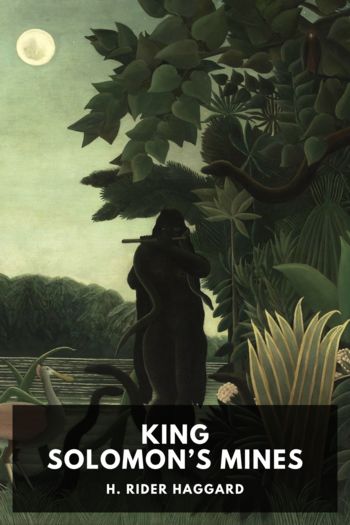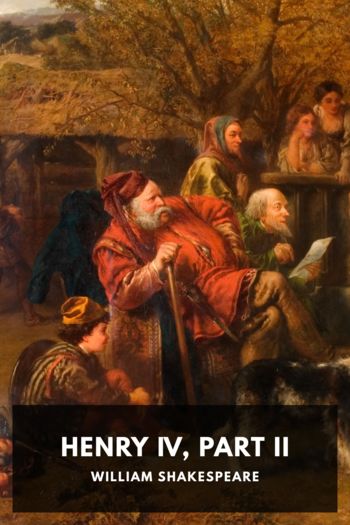King Solomon’s Mines - H. Rider Haggard (best life changing books .TXT) 📗

- Author: H. Rider Haggard
Book online «King Solomon’s Mines - H. Rider Haggard (best life changing books .TXT) 📗». Author H. Rider Haggard
“Indeed, now what makes you think so?” I asked.
“Think so. I don’t think at all. Why there”—as she righted herself after a roll—“if the ship had really rolled to the degree that thing pointed to, then she would never have rolled again, that’s all. But it is just like these merchant skippers, they are always so confoundedly careless.”
Just then the dinner-bell rang, and I was not sorry, for it is a dreadful thing to have to listen to an officer of the Royal Navy when he gets on to that subject. I only know one worse thing, and that is to hear a merchant skipper express his candid opinion of officers of the Royal Navy.
Captain Good and I went down to dinner together, and there we found Sir Henry Curtis already seated. He and Captain Good were placed together, and I sat opposite to them. The captain and I soon fell into talk about shooting and whatnot; he asking me many questions, for he is very inquisitive about all sorts of things, and I answering them as well as I could. Presently he got on to elephants.
“Ah, sir,” called out somebody who was sitting near me, “you’ve reached the right man for that; Hunter Quatermain should be able to tell you about elephants if anybody can.”
Sir Henry, who had been sitting quite quiet listening to our talk, started visibly.
“Excuse me, sir,” he said, leaning forward across the table, and speaking in a low deep voice, a very suitable voice, it seemed to me, to come out of those great lungs. “Excuse me, sir, but is your name Allan Quatermain?”
I said that it was.
The big man made no further remark, but I heard him mutter “fortunate” into his beard.
Presently dinner came to an end, and as we were leaving the saloon Sir Henry strolled up and asked me if I would come into his cabin to smoke a pipe. I accepted, and he led the way to the Dunkeld deck cabin, and a very good cabin it was. It had been two cabins, but when Sir Garnet Wolseley or one of those big swells went down the coast in the Dunkeld, they knocked away the partition and have never put it up again. There was a sofa in the cabin, and a little table in front of it. Sir Henry sent the steward for a bottle of whisky, and the three of us sat down and lit our pipes.
“Mr. Quatermain,” said Sir Henry Curtis, when the man had brought the whisky and lit the lamp, “the year before last about this time, you were, I believe, at a place called Bamangwato, to the north of the Transvaal.”
“I was,” I answered, rather surprised that this gentleman should be so well acquainted with my movements, which were not, so far as I was aware, considered of general interest.
“You were trading there, were you not?” put in Captain Good, in his quick way.
“I was. I took up a wagon-load of goods, made a camp outside the settlement, and stopped till I had sold them.”
Sir Henry was sitting opposite to me in a Madeira chair, his arms leaning on the table. He now looked up, fixing his large grey eyes full upon my face. There was a curious anxiety in them, I thought.
“Did you happen to meet a man called Neville there?”
“Oh, yes; he outspanned alongside of me for a fortnight to rest his oxen before going on to the interior. I had a letter from a lawyer a few months back, asking me if I knew what had become of him, which I answered to the best of my ability at the time.”
“Yes,” said Sir Henry, “your letter was forwarded to me. You said in it that the gentleman called Neville left Bamangwato at the beginning of May in a wagon with a driver, a voorlooper, and a Kafir hunter called Jim, announcing his intention of trekking if possible as far as Inyati, the extreme trading post in the Matabele country, where he would sell his wagon and proceed on foot. You also said that he did sell his wagon, for six months afterwards you saw the wagon in the possession of a Portuguese trader, who told you that he had bought it at Inyati from a white man whose name he had forgotten, and that he believed the white man with the native servant had started off for the interior on a shooting trip.”
“Yes.”
Then came a pause.
“Mr. Quatermain,” said Sir Henry suddenly, “I suppose you know or can guess nothing more of the reasons of my—of Mr. Neville’s journey to the northward, or as to what point that journey was directed?”
“I heard something,” I answered, and stopped. The subject was one which I did not care to discuss.
Sir Henry and Captain Good looked at each other, and Captain Good nodded.
“Mr. Quatermain,” went on the former, “I am going to tell you a story, and ask your advice, and perhaps your assistance. The agent who forwarded me your letter told me that I might rely on it implicitly, as you were,” he said, “well known and universally respected in Natal, and especially noted for your discretion.”
I bowed and drank some whisky and water to hide my confusion, for I am a modest man—and Sir Henry went on.
“Mr. Neville was my brother.”
“Oh,” I said, starting, for now I knew of whom Sir Henry had reminded me when first I saw him. His brother was a much smaller man and had a dark beard, but now that I thought of it, he possessed eyes of the same shade of grey and with the same keen look in them, the features, too, were not unlike.
“He was,” went on Sir Henry, “my only and younger brother, and till five years ago I do not suppose that we were ever a month away from each other. But





Comments (0)